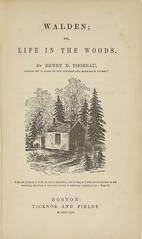 This July 12 marks the bicentennial birthday of poet, essayist, social activist and philosopher Henry David Thoreau. He was born in Concord, Mass., where his father owned a pencil factory. Thoreau studied at Harvard College, though he apocryphally refused to pay the $5 fee for his diploma. He became a public school teacher, then resigned rather than use corporal punishment on his students. The young Thoreau's writing career was nurtured by like-minded locals such as Ralph Waldo Emerson, Nathaniel Hawthorne, Ellery Channing and Margaret Fuller. In 1845, following the advice of Channing to "build yourself a hut, & there begin the grand process of devouring yourself alive," Thoreau set out on a two-year stint of simple living in a cabin on the banks of Walden Pond in Concord.
This July 12 marks the bicentennial birthday of poet, essayist, social activist and philosopher Henry David Thoreau. He was born in Concord, Mass., where his father owned a pencil factory. Thoreau studied at Harvard College, though he apocryphally refused to pay the $5 fee for his diploma. He became a public school teacher, then resigned rather than use corporal punishment on his students. The young Thoreau's writing career was nurtured by like-minded locals such as Ralph Waldo Emerson, Nathaniel Hawthorne, Ellery Channing and Margaret Fuller. In 1845, following the advice of Channing to "build yourself a hut, & there begin the grand process of devouring yourself alive," Thoreau set out on a two-year stint of simple living in a cabin on the banks of Walden Pond in Concord.
Thoreau's time on Walden Pond begat his two greatest works. The first, the essay "Civil Disobedience," resulted from Thoreau's brief stint in prison over his refusal to pay taxes. Thoreau objected to slavery and the Mexican-American War, and argued that an individual could not allow a government to overrule their conscience, an approach that influenced Mahatma Gandhi and Martin Luther King, Jr. Walden (1854) is a transcendentalist tract on Thoreau's spiritual self-discovery and practical lessons on isolated life, perhaps best explained by the book's most famous lines: "I went to the woods because I wished to live deliberately, to front only the essential facts of life, and see if I could not learn what it had to teach, and not, when I came to die, discover that I had not lived." --Tobias Mutter

